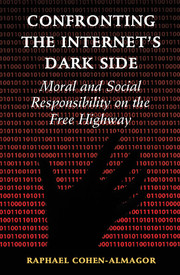Book contents
- Frontmatter
- Dedication
- Contents
- Acknowledgments
- List of Abbreviations
- Introduction
- 1 Historical Framework
- 2 Technological Framework
- 3 Theoretical Framework
- 4 Agent's Responsibility
- 5 Readers' Responsibility
- 6 Responsibility of Internet Service Providers and Web-Hosting Services, Part I: Rationale and Principles
- 7 Responsibility of Internet Service Providers and Web-Hosting Services, Part II: Applications
- 8 State Responsibility
- 9 International Responsibility
- Conclusion
- Glossary
- Selected Bibliography
- Index
8 - State Responsibility
Published online by Cambridge University Press: 05 July 2015
- Frontmatter
- Dedication
- Contents
- Acknowledgments
- List of Abbreviations
- Introduction
- 1 Historical Framework
- 2 Technological Framework
- 3 Theoretical Framework
- 4 Agent's Responsibility
- 5 Readers' Responsibility
- 6 Responsibility of Internet Service Providers and Web-Hosting Services, Part I: Rationale and Principles
- 7 Responsibility of Internet Service Providers and Web-Hosting Services, Part II: Applications
- 8 State Responsibility
- 9 International Responsibility
- Conclusion
- Glossary
- Selected Bibliography
- Index
Summary
Without commonly shared and widely entrenched moral values and obligations, neither the law, nor democratic government, nor even the market economy will function properly.
–Václav Havel
Simon Guy Sheppard and Stephen Whittle do not like Jews and black people, and they believe that the Holocaust is a hoax. Both were charged and convicted in Britain for possessing, publishing, and distributing racially inflammatory material. Sheppard operated and contributed to a number of websites, including heretical.com, klan.org, nazi.org, and whitepower.co.uk. Having edited material written by Whittle, Sheppard posted it to a website in Torrance, California, thinking that by doing so he was shielded by the First Amendment to the US Constitution. The British Crown Court decided that it had jurisdiction to try the appellants for their conduct because a substantial measure of the activities constituting the crime took place in England. Sheppard was sentenced to 3 years and 10 months in jail, and Whittle was sentenced to 1 year and 10 months imprisonment. The message is clear: England does not tolerate hate speech on the Internet. It sees it as its responsibility to protect vulnerable minorities from bigoted, inflammatory, hateful expression.
In his germinal cyber law scholarship, Lawrence Lessig distinguishes between two claims. One claim is that, given the Internet's architecture, governments find it difficult to regulate behavior on the Net. The other claim is that it is difficult for governments to regulate the architecture of the Net. The first claim is true. The second is not. It is not hard for governments to take steps to alter Net architecture and, in so doing, help regulate Net behavior.
In the mid 1990s, the Internet seemed a perfect medium for business: it was supranational and diffusive, had wide distribution and little regulation, and offered enormous opportunities to investors.
- Type
- Chapter
- Information
- Confronting the Internet's Dark SideMoral and Social Responsibility on the Free Highway, pp. 230 - 274Publisher: Cambridge University PressPrint publication year: 2015



